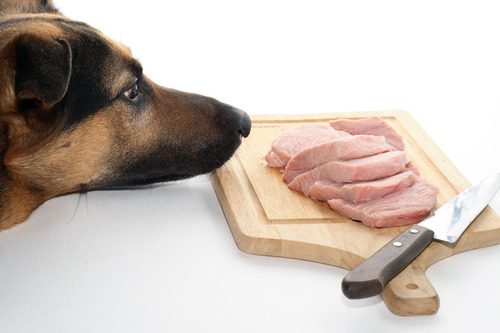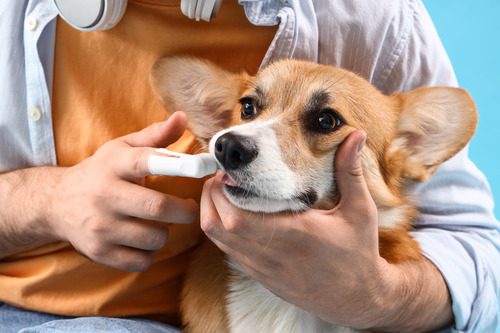Help! My Dog Keeps Scratching and I Don’t Know What to Do!
While it is perfectly normal for dogs to scratch, it can be concerning if your dog keeps scratching all the time out of seemingly nowhere. Why does this happen? There are a variety of reasons that we explore below and some options to help your dog feel more comfortable.

Parasites Can Cause Your Dog to Scratch
External parasites include fleas, ticks, and lice. Fleas are common and can be extremely irritating to dogs. Many dogs develop flea allergies, which is an allergic response to a flea bite and will make a flea infestation even more irritating and increase scratching.
Fleas
If you suspect fleas, your vet can point you to options to eliminate fleas on your dog (topical medications that last 30 days) and in your home (carpet cleaner). Use caution with over the counter flea topical medications as many have been found to be extremely irritating and can cause even more shedding.
Ticks
Ticks are becoming a problem in more and more areas, and you don’t need to have been on a wooded hike to find them on your dog. Ticks are found in many areas, especially in long grass or wooded areas. They attach to the dog and start feeding off blood (always a good idea to check yourself and your dog for ticks if you have been in a known tick area).
The bad news is aside from being irritating, ticks carry a variety of diseases that can be spread to dogs and humans and can lead to serious symptoms. The good news is that is takes about 48 hours of the tick feeding on a host to spread these diseases. Using a topical tick preventative every month on your dog will kill any ticks that attach before they can spread disease. If you know your dog is very sensitive to biting insects, it is always a good idea to monitor them for ticks after each walk.
Lice
Lice are rarer, but they can occur. They are often hard to see and usually will require a veterinarian to find and diagnose them. Lice are seen most often in puppies or rescue animals that have spent time in tough environments. Lice are extremely irritating and will cause scratching and shedding.
Allergies
Dogs can have seasonal allergies, just like people. Scratching is a reaction to an itchy face or skin from irritants. Some dog allergies can also be from detergent used on their bedding, shampoo, or airborne particles in the house.
Seasonal Allergies
For seasonal allergies, your vet can help you with treatment options (there are oral medications or injections that last several weeks). It is a good idea to wipe off your allergic dog’s paws or full coat after they have been outside to decrease allergens on their fur. Unscented baby wipes or wipes specially designed for dogs work well for this.
Detergent
If you noticed excessive scratching after washing your dog’s bed or clothing, try a new detergent. All natural or detergents without dyes and perfumes are most likely to be agreeable to your dog’s skin. Washing bedding and dog clothing frequently will also help reduce any allergens that accumulate and keep the scratching to a minimum.
Scratching After Baths?
If your dog is scratching a lot after a bath, you may want to examine the shampoo you used. Human shampoo can be used on dogs, but it will remove more of the natural oils on your pup’s fur than shampoo for dogs. Perfumes and dyes can also be irritating. Flea shampoos found over the counter are extremely irritating and sometimes even cause skin burns.
Specially designed dog shampoos help ensure the needed oils stay in the correct balance on the dog’s fur and are usually tear-free (always check the bottle though). There are many options for hypoallergenic dog shampoos that will help with scratching and eliminate some of the allergens on their body.
If your dog has airborne allergies, it may be a good solution to bathe them frequently to help the scratching. Oatmeal soaks that stay on the fur for a few minutes will also soothe the skin and help your pup feel better!
Household Hints
A lot of solutions that will help your pup feel less itchy and stop the excessive scratching will also help your home feel cleaner and fresher.
Replace Your Air Filters
A fast solution to help with airborne allergens is to purchase a home air filter. These come in a variety of sizes and with different filter options.
HEPA filters are the best at removing airborne particles (and can help remove smells in the air too!). There are also special furnace filters that can help as well, from HEPA options to other allergen reducing styles. A word of caution, scented filters may seem like a good idea to remove “doggy smells” from the house, but these can sometimes be irritating to dogs and cause more scratching.
Vacuum Regularly
Vacuuming regularly will also help with itching and allergens. Many vacuums have “pet specific” styles with special filters and attachments to help remove animal dander and irritants. Yes, animals CAN be allergic to each other, I once knew a horse that was allergic to cats!
This doesn’t mean they cannot live happily together, but you may need to out in more effort to vacuum or treat the allergies. Harsh cleaning solutions can be very irritating to dogs and can cause scratching. If you plan to clean with heavy-duty chemicals, arrange for your dog to be away from the home or outside if at all possible.
Make sure all surfaces are dry and fumes are gone before allowing them back in. Note if your dog starts scratching after lying on a certain rug or rubbing against a certain plant. They may have an allergy or sensitivity to that item and moving it out of their environment can make a world of difference!
Grooming
We already discussed bathing for your itchy dog, but what about brushing? Brushing regularly can help distribute skin oils and reduce scratching. Grooming time can help you bond with your pup and also give you a heads up for any lumps, bumps, or scratches that pop up.
If your dog is a handful or dislikes grooming, contact your vet or a local groomer and ask for a demonstration. They may have some tips or tricks to help your dog look forward to being brushed.
When in Doubt, Call Your Veterinarian
Scratching, especially at 3am, can be concerning and frustrating. If you have concerns or are worried there is a bigger underlying issue, it is always good to contact your veterinarian. They can advise you and get your pup feeling less itchy!
Recent Posts
Can Dogs Eat Ham?
Can Dogs Eat Ham? Many pet owners wonder about the safety of sharing human foods with their…
Can Dogs Eat Turkey Bones?
Can Dogs Eat Turkey Bones? Thanksgiving and holiday feasts often include a delicious turkey as the centerpiece….
Cat & Dog Teeth Brushing Tips
Cat & Dog Teeth Brushing Tips Good dental care is essential for your pets, just like it…
About Us
Originally opened as Animal Care Hospital by Dr. Mark Johnston in 1989, the hospital became Cornerstone Veterinary Hospital in 2015 when it was purchased by Drs. Alan and Lisa Knott. The name 'Cornerstone' holds a special place in their hearts, representing not only their Christian faith but also their commitment to being the cornerstone of the community in which they practice. As a family-owned and operated practice, every pet is treated as part of the family, ensuring they receive the highest standard of care. The team at Cornerstone Veterinary Hospital is dedicated to building lasting relationships with clients and their beloved pets, striving to be the cornerstone of the community in which they practice.



